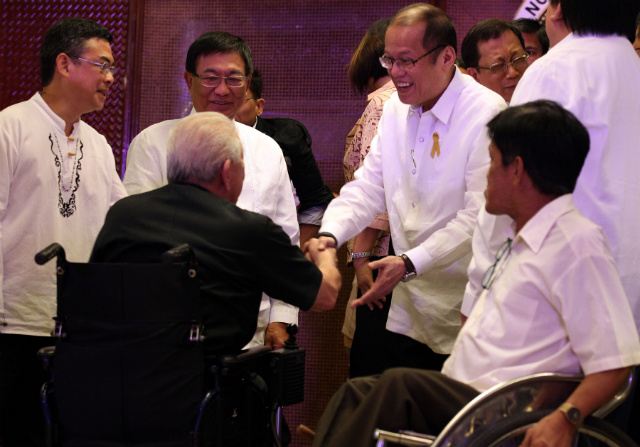SUMMARY
This is AI generated summarization, which may have errors. For context, always refer to the full article.

MANILA, Philippines – The Philippine Health Insurance Corporation (PhilHealth) launched on Thursday, October 31, its first benefit package for persons with disabilities (PWDs).
The Z-Morph Prosthesis Package will provide P15,000 worth of benefits to qualified PhilHealth members or dependents in need of lower limb prosthesis, a device replacing a missing part of one’s body.
President Benigno Aquino III said his administration is studying how to expand the coverage, which is initially available in 3 Philippine hospitals: the University of the East Ramon Magsaysay Memorial Medical Center, the Philippine General Hospital, and the Philippine Orthopedic Center.
“Kung nabaldado ka o naputulan ng paa, ipakita mo lang ang iyong PhilHealth card, at maaari mo nang makuha ang kinakailangang serbisyo-medikal,” the President said during the launch at Heroes’ Hall in Malacañang.
(If you are crippled or your feet was cut off, just show your PhilHealth card, and you can avail yourself of the needed medical service.)
Raissa Laurel-Subijano, a law student who lost her leg in a hand grenade explosion during the Sept 26, 2010, Philippine Bar Examinations, said the package will be of great help to many PWDs who rely mainly on charitable institutions to raise funds for their limb prosthesis.
In her speech during PhilHealth’s event launch, Subijano shared how the 2010 tragedy changed her life.
“It was difficult for my parents to sign the form amputating both my legs. Life over limb, as the doctors would say…. I woke up knowing I lost both of my legs. But I never gave up,” she said.
The 25-year old said PhilHealth’s new prosthesis package provides hope for PWDs.
“[It] will restore their confidence, will allow independent mobility, and empower them not only as productive members but leaders of society,” she said.

Benefit to be expanded
PhilHealth president Alex Padilla said the health benefits for PWDs will still be expanded and is consistent with the principles his agency stands for.
“Every Filipino, especially the poor, shall have the right to demand quality care from our hospitals, because PhilHealth has already paid for it,” he said. “Quality health is a matter of right and not merely a privilege, a right that can be demanded and not merely bestowed.”
The national health insurance agency was recently under fire after an October 2013 Commission on Audit (COA) report revealed that P1.48 billion in bonuses and incentives were released to its employees and private contractors in 2012.
PhilHealth was quick to defend the legality of the disbursement, saying Republic Act 7875 allows the government corporation “to fix the compensation of and appoint personnel as may be deemed necessary.”
Dr Israel Francis Paragas, PhilHealth vice president for corporate affairs, said they are willing to challenge COA in court if need be.
All-case rate packages
In addition to the Z-Morph Prosthesis Package, PhilHealth also launched on Thursday its all-case rate packages.
Case rate packages allocate a fixed amount per disease for reimbursement by PhilHealth. Case-based payments started in 2011, replacing the fee-for-service scheme where health care providers were paid for each service they provided.
PhilHealth said studies show the fee-for-service payment scheme has led to prolonged hospital stays, over-utilization of diagnostic procedures, and provision of unnecessary health care services just so hospitals and doctors could collect more.
Prior to the all-case rate packages, the per-case payment applied to only 11 medical cases and 14 surgical cases.
“Going all-case rates is advantageous to the members as well as the health care providers. It will be easier to communicate a uniform rate for the provision of minimum level of quality care under the most modest accommodations,” said Padilla. – Rappler.com
Add a comment
How does this make you feel?
There are no comments yet. Add your comment to start the conversation.